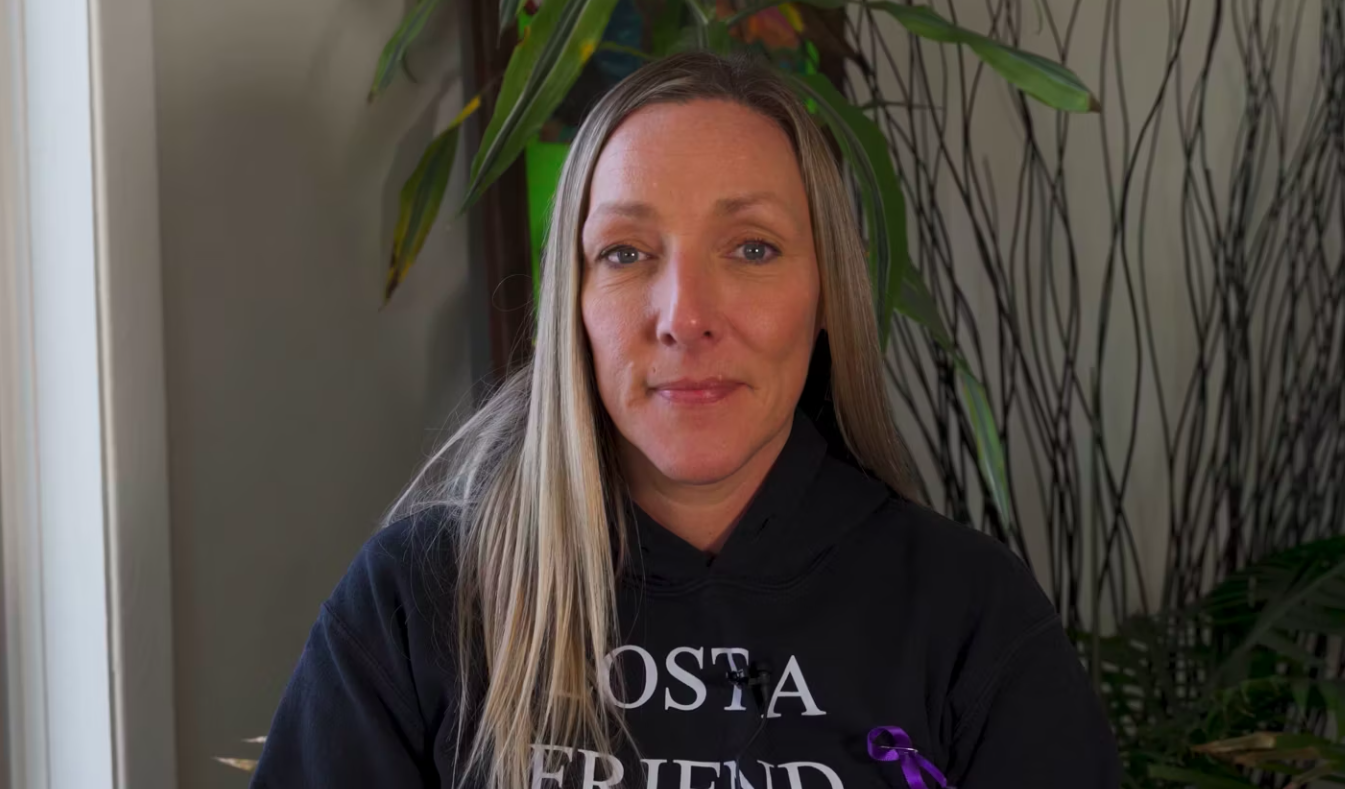Posts Tagged ‘self care’
Craig – There is No Right Way to Grieve
Craig – There is No Right Way to Grieve
Craig talks about his experience with grief and how there is no right or wrong way to grieve. He shares his thoughts on how to allow yourself to do what you need to do to heal, even if it doesn’t seem like “self-care.” This video is a reminder that everyone grieves differently and that there is no one-size-fits-all approach to healing.
Angie – Cumulative grief, cumulative trauma
Angie – Cumulative grief, cumulative trauma
Angie discusses the challenges of policing and how trauma and grief can accumulate
Angie – Grief and Policing
Angie – Grief and Policing
Angie talks about policing and priorities and the importance of self care
Angie – Preparing for Grief on the Job
Angie – Preparing for Grief on the Job
Angie explains her thoughts on fitting in and doing the right thing
Jessica M – Grief is unique for each person
Jessica M – Grief is unique for each person
Jessica discusses our uniquenesses during grief, giving yourself permission to grieve and that there are many ways of self care during grief.
Nicole – Advice for Other Professionals Managing Grief
Nicole – Advice for Other Professionals Managing Grief
Nicole discusses dealing with repeated loss while working in community outreach, not being afraid to be human.
Weathering the Intense Emotions of Grief
Post by Maureen Pollard, MSW, RSW
Grief often comes with powerful, unpredictable emotional shifts that can be painful to experience. While it’s important to find ways to sit with these feelings, to acknowledge the pain of grief and accept loss, it’s also necessary to find ways to ease and manage the pain. There are several simple activities that you can explore to help.
Ground Yourself in the Present
Use your senses to remind you that you are safe, here and now. When we are feeling intense emotions we are often caught reliving a moment in the past, or we are fretting over some anticipated event in the future. We can’t undo the past and we can’t control the future, which only intensifies these difficult feelings. When you use your senses, it pauses your racing thoughts and can help calm the turbulent feelings.
Notice the things in your environment you can see. Count the number of items that begin with the letter A, then the letter B, or count the number of green things.
Notice what you feel around your body. Sense the ground under your feet, the chair under your bottom, the clothes against your skin, the sun on your cheeks, or the breeze in your hair.
Notice what you hear. Voices. Background noises of the building such as the furnace or a fan or the hum of fluorescent lights. Music. Nature sounds.
Notice what you smell. Is the air stale or fresh? Is there some overpowering smell, or not much smell at all?
Notice if you have a taste in your mouth. Is it the sweetness or savoury taste of something you just ate, the minty freshness of toothpaste or gum, or perhaps the sour taste of morning breath.
Breathe.
A deep slow breath can activate the calming centre of our nervous system. When you breathe deeply and exhale slowly, you set off a cascade of calming chemicals in your brain that help ease tension and stress.
Try 4-7-8 breathing. Inhale as you count to four. Hold your breath for a count of seven. Exhale as you count to eight. Repeating this breath three times takes less than one minute, and when you practice it often you develop a muscle memory that helps you access this deep, slow breath during times of strife.
Indulge in Self Care
Enjoy a cup of your favourite herbal tea or soup. Take a hot bath, perhaps adding Epsom salts. Or a shower with your favourite body wash. The warmth and scent of these activities will work together to activate the same calming centre in your nervous system that is affected by deep, slow breathing.
Plan Intentional Change
Sometimes our routines cue us to experience distressing memories and disturbing thoughts and feelings. When this is the case, it can help to examine your schedule and activities. What seems to upset you? Is there a way to pause the activity or shift it to another time of day to try to break the connection with the difficult experience?
It’s true that we can’t help our thoughts and feelings. It’s also true that we can develop responses to the experience of intense grief that help us feel more in control as we heal.
Jean – Grief resources and self care
Jean – Grief resources and self care
Jean talks about resources that help in processing grief and self care
Kim – Self care
Kim – Self care
Kim talks about looking after yourself and how much it helps. In particular be kind to yourself
Disenfranchised Grief – When It Feels Like Your Grief Doesn’t Matter
Post by Maureen Pollard, MSW, RSW
Disenfranchised Grief – When It Feels Like Your Grief Doesn’t Matter
Grief that is acknowledged, validated and supported is grief that has access to pathways for healing. There are some losses that don’t receive this attention and respect. Disenfranchised grief is the name for what we experience when a loss is not acknowledged in our community.
Disenfranchised grief occurs with any loss that remains unspoken and is not validated. Some of these types of losses include pregnancy loss, LGBTQ2S+ partnership losses, suicide, overdose death, the loss of a co-worker, neighbour or pet. These losses tend to be considered less valid and less important than losses in some of our primary and close relationships. There is often no acknowledgement and little support for people who experience disenfranchised loss.
This grief is just as real and powerful as grief that is accepted by society. You’ll feel powerful, unpredictable emotions, you’ll find yourself shifting through the experience of grief as you adapt to this loss, just as you would with any validated loss. The primary difference is in the sense of isolation you’ll feel, and the minimizing indifference or disbelief so many people in your circles will express if you talk about your grief.
How to Take Care of Yourself
Validate yourself. Your loss is real, it is important and you can trust your experience of grief. You don’t need someone else’s permission to grieve.
Seek the support of others who validate your grief. There may be a peer support group, or a professional who is informed and experienced in the area of your loss who can share information and insights about your grief based on others who have walked this path before you.
Create ritual and ceremony to honour your grief. There may be an activity that is meaningful to you and helps you feel you are acknowledging the importance of this loss. Light a candle. Make art. Engage in an act of kindness in memory of your loved one.
Share your story and offer validation to others. If and when you feel strong enough to bring your grief to the world in a way that may help others who experience this type of loss after you, you can offer the wisdom gained from your own pain to guide others to the knowledge that their grief is real, and worthy of attention and support, too. Although it is not necessary, helping others can help you further your own healing, too.
Care and Well-Being for Grievers and Their Supporters
Post by Maureen Pollard, MSW, RSW
Care and Well-Being for Grievers and Their Supporters
Grief can be all consuming. It can monopolize our attention and drain our energy. When we are grieving, we can forget to tend to our well-being. This is also true when we are supporting someone who is experiencing raw, deep or complex grief.
Factors that support well-being become important as we work toward recovering in grief. We need ways to help us find our balance again as we adjust to a world without our loved one.
Compassion
Be gentle with yourself, and with others. We are all generally doing the best we can do under difficult circumstances.
Acknowledge the Pain and Suffering
Pain is inevitable. Suffering happens when we resist the reality of the pain. When we are able to admit that a situation is terrible and hurts us deeply, we shift into facing it and may begin to heal.
Communication
It’s important to be able to be honest, and to expect honesty in return. If you feel like you have to hide facts or feelings, it can be distressing. Be mindful that being honest doesn’t mean we must be blunt or harsh; we can be tender and kind in our honest moments.
Self-care for Stress Management
Eat well. It will help you fuel your mind and body and prepare you to handle whatever comes next. Move more. You can discharge some of the tension and use up some of your emotional energy when you move. Make sleep a priority. We heal, physically and emotionally, when we sleep. Connect with others who accept and understand your situation. When you feel acknowledged and validated by someone it can help you accept your situation.
Create a Safe Space
Whether it is a room in your home, just a corner of a room or some other place in your community, the availability of a safe space is important for a sense of well-being. This place will feel comfortable, and you’ll be able to let your guard down here. Perhaps there is a comfortable chair or bench for you to sink into. Maybe it is very private, allowing you to release your feelings with tears or other expressions of emotion without worrying about judgement.
Know Your Limits
It’s a good idea to try to notice your stress signals. Pay attention to what happens in your body. Do you get headaches, a knot at the back of your neck, tightness in your chest or clenching in your gut? Does your mind begin to race, distracting you and increasing your tension? When you become self aware, you can take steps to care for yourself at the earliest signs of distress rather than waiting until you are close to breaking down.
Ask for Help
Whether you are grieving, or trying to support someone you care about as they grieve, don’t be afraid to ask for help. We all need someone caring on our side sometimes to walk with us through the difficult parts of life and death.
Marija – Permission to mourn
Marija – Permission to mourn
Marija discusses the value of being allowing yourself to mourn




